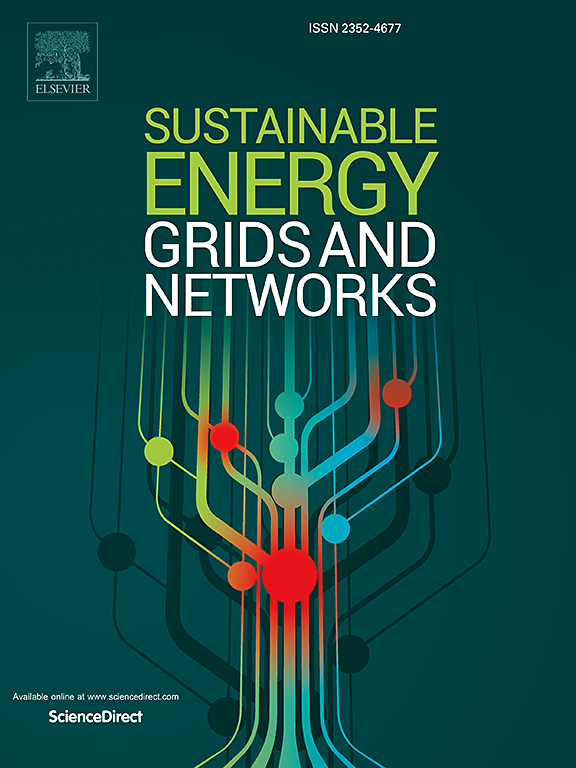Robust stackelberg game strategies for managing demand uncertainty in energy trading problems
IF 4.8
2区 工程技术
Q2 ENERGY & FUELS
引用次数: 0
Abstract
Peer-to-peer (P2P) energy trading is emerging as a promising approach for facilitating energy sharing among microgrids. This paper addresses the P2P energy trading problem using a robust Stackelberg game (RSG) approach, where producers and consumers are modeled as multiple leaders and followers, respectively, within a power system, while accounting for demand uncertainty. The robust noncooperative framework treats the energy trading problem as a competitive game among self-interested prosumers, each selecting a demand strategy to maximize their own benefit. The study also incorporates the impact of carbon emissions and transmission costs. To solve the social welfare function, a dual decomposition method is employed. Simulation results demonstrate the convergence performance, fairness, and scalability of the proposed decentralized approach for market clearing in P2P energy trading scenarios. The findings reveal that the method not only reduces trading costs for consumers and enhances utility for producers but also increases producer profits by compared to conventional methods.
能源交易中需求不确定性管理的鲁棒stackelberg博弈策略
点对点(P2P)能源交易正在成为促进微电网之间能源共享的一种有前途的方法。本文使用稳健的Stackelberg博弈(RSG)方法解决P2P能源交易问题,其中生产者和消费者分别被建模为电力系统中的多个领导者和追随者,同时考虑到需求的不确定性。鲁棒非合作框架将能源交易问题视为自利消费者之间的竞争博弈,每个消费者都选择一种需求策略来最大化自己的利益。该研究还纳入了碳排放和传输成本的影响。为了求解社会福利函数,采用对偶分解方法。仿真结果证明了所提出的去中心化方法在P2P能源交易场景下的收敛性能、公平性和可扩展性。研究结果表明,该方法不仅降低了消费者的交易成本,提高了生产者的效用,而且与传统方法相比,生产者的利润提高了34.56%。
本文章由计算机程序翻译,如有差异,请以英文原文为准。
求助全文
约1分钟内获得全文
求助全文
来源期刊

Sustainable Energy Grids & Networks
Energy-Energy Engineering and Power Technology
CiteScore
7.90
自引率
13.00%
发文量
206
审稿时长
49 days
期刊介绍:
Sustainable Energy, Grids and Networks (SEGAN)is an international peer-reviewed publication for theoretical and applied research dealing with energy, information grids and power networks, including smart grids from super to micro grid scales. SEGAN welcomes papers describing fundamental advances in mathematical, statistical or computational methods with application to power and energy systems, as well as papers on applications, computation and modeling in the areas of electrical and energy systems with coupled information and communication technologies.
 求助内容:
求助内容: 应助结果提醒方式:
应助结果提醒方式:


